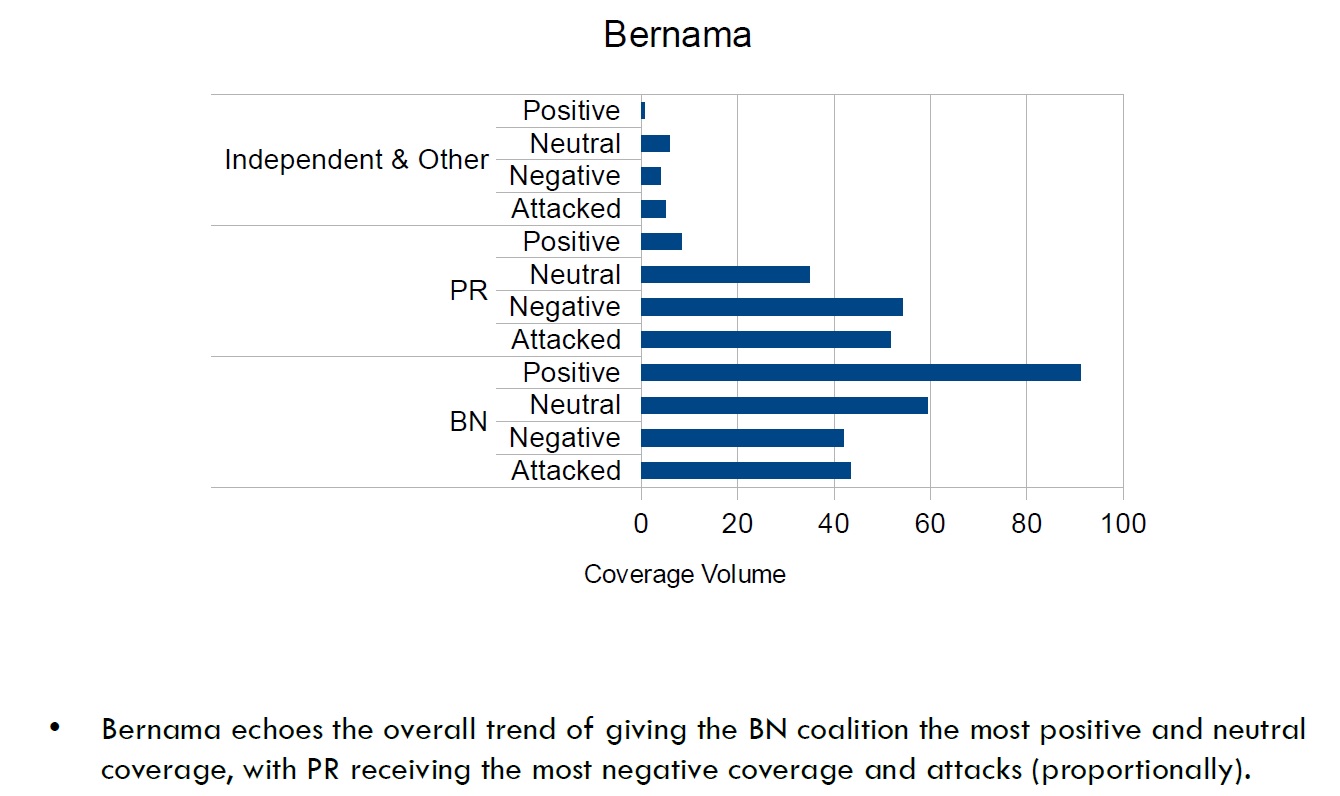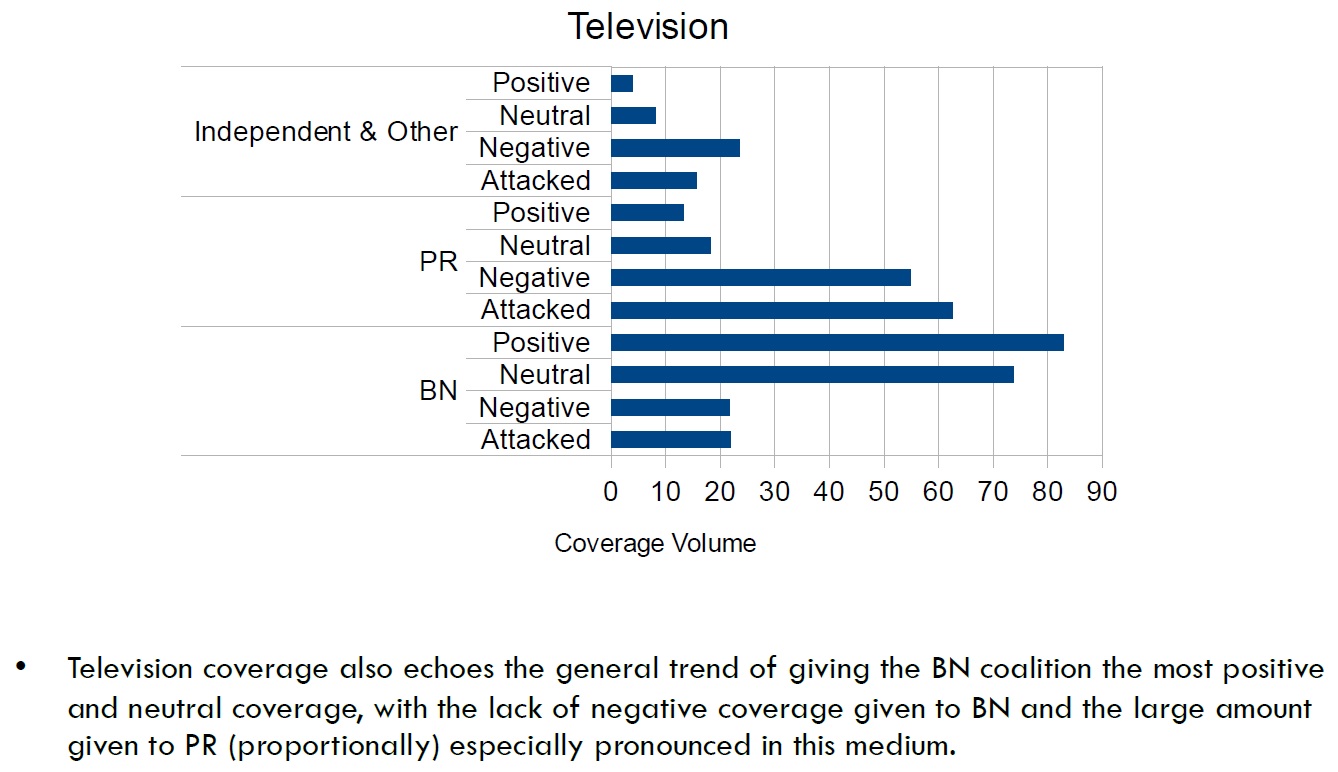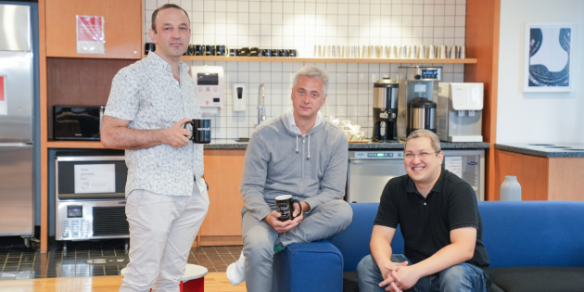(2013 Top 10 Story) Online has most balanced GE13 coverage: Media watchdog
By A. Asohan February 12, 2014
(Originally published April 23, 2013)
Continuing DNA ‘series rerun’ of its Top 10 most-read stories of 2013, No 9 came in just a day after No 10, and was about Malaysia’s upcoming general election as well – and just as importantly, looked at the changing media landscape in the country.
This report came out at a time when the Malaysian Government had been stepping up its attacks against online media, saying their reports were unprofessional and lacked balance, and compared them unfavourably with the mainstream media.
The independent data cited in this article however showed quite the opposite, and serves as an indictment not only of the mainstream media in Malaysia, but of the Government and how it regards the media. – A. Asohan
- GE13 coverage from 29 media outlets, from online to broadcast and print, analyzed over one week
- Actual data shows online media has most balanced coverage, contrary to pro-Opposition allegations
 ACTUAL data from a media monitoring initiative has proven what many Malaysians have suspected all along: That the online media provides more balanced political coverage than the mainstream media.
ACTUAL data from a media monitoring initiative has proven what many Malaysians have suspected all along: That the online media provides more balanced political coverage than the mainstream media.
In the first set of results that came out of the Watching the Watchdog (WTW) media monitoring exercise spearheaded by the Center for Independent Journalism (CIJ) and supported by the University of Nottingham Malaysia Campus (UNMC), state-controlled television and the national news agency Bernama showed the greatest bias (click chart to enlarge).
The skewed coverage includes both the volume of coverage and the tone of the coverage, according to an April 22 panel on Google Hangouts that discussed the findings.
The WTW media monitoring exercise is being conducted as Malaysia heads to the polls on May 5 in what has been described as the “mother of all elections.”
Political observers have said that the 13th general election (GE13) may see a change of government for the first time in nearly 56 years of the country’s independence.
The ruling coalition, the Barisan Nasional, lost its two-third majority for the first time ever in the last election in 2008.
That year, the then-nascent Opposition alliance known as Pakatan Rakyat also won control of a record five states, although one – Perak – fell under Barisan rule again after three assemblymen quit the Opposition alliance.
The stunning results in 2008 were largely attributed to Malaysians increasingly gaining more independent news via the Internet, since almost all mainstream media outlets in Malaysia are owned by Barisan parties and controlled by very repressive media laws.
“The data supports what we’ve arguing all along – that Malaysian voters are being seriously deprived of fair and objective information on the political parties and coalitions that are involved in GE13,” said Dr Tessa Houghton, assistant professor in Media and Communication and director of the Center for the Study of Communication and Culture at UNMC.
WTW’s monitoring, which covered 29 media outlets from newspapers and television stations to websites, in a variety of languages, found that:
- The ruling BN coalition and its parties were given the most coverage overall, often by a significant margin;
- The ruling BN coalition and its parties were given the most favorable coverage overall, often by a significant margin;
- The only news sources which did not conform to the above trends are the online news portals, which gave approximately equal quantities and quality of coverage to both Barisan and Pakatan; and
- Newspapers and television news (click chart below to enlarge) heavily favored Barisan in terms of both the quantity and quality of coverage devoted to the coalition and its parties.
 The first report comes from the first week of its monitoring, which began April 6 and will end two days after polling.
The first report comes from the first week of its monitoring, which began April 6 and will end two days after polling.
The results, which would not surprise most Malaysians, will be seen as a blow to Barisan, which has been trying its best to portray the online media as the least reliable and credible of media organizations.
In March last year, Prime Minister Najib Razak reiterated Barisan’s intent to rein in the electronic media, saying that “the Government will carry out a comprehensive study for the need for an act such as existing ones to take into account of the development in information communication technology.”
Citing WTW’s findings, especially on the tone of coverage in the online media – in this case, Malaysiakini and The Malaysian Insider, including their different language editions – Houghton said, “We can make the statement that the online media has been the most even-handed in their coverage, of the four different media types analyzed.”
“This is about voters making informed choices, and they can’t do that if they don’t have access to media that is fair,” said another panelist, Ambiga Sreenevasan, founder and co-chairman of Bersih, a civil society movement for free and fair elections.
This is why, she said, Bersih had put free and fair access to the media by all political parties as one of its eight demands.
Bersih’s three peaceful rallies demanding fair elections saw hundreds of thousands of Malaysians taking to the streets.
Ambiga noted that there were two implications here: That more Malaysians would seek the online media for balanced coverage; but worryingly, that there is a segment of Malaysian society that did not have access to all the information they had a right to.
“The losers at the end of the day are the voters, who will not be able to make informed choices when they go to the ballot boxes,” said CIJ Malaysia executive officer Masjaliza Hamzah.
This goes back to why CIJ is conducting this monitoring exercise, she said. “Now you can see; you’ve got the data; you’ve got the statistics to really show how bad it is,” she said, referring to the media bias.
“For the first time, we are able to quantify how Bernama covers the different political parties,” Masjaliza said, noting that the national news agency is supported by public funding and thus has a particular role to play. “A role it is not playing,” she added.
Meanwhile, Sanjiv Indran, a doctoral student at UNMC, said the findings explained why many Malaysians of his generation are going to the online media for their news.
“The data also shows that the online media is actually not pro-Opposition as some people have alleged,” he said. “It is actually quite neutral, and gives balanced coverage to both Barisan and Pakatan.”
The WTW panel discussion was moderated by Zaharom Nain, professor of Media and Communication Studies and director of research for the Faculty of Arts and Social Sciences at UNMC. He is also vice president of the Malaysian Social Science Association and is on CIJ Malaysia’s advisory panel.
The panel discussion can be viewed on YouTube here. WTW’s report can be downloaded as a PDF here.
Related Stories:
GE13: Eyes on the media too
GE13: Technology and democracy, like a horse and carriage
Google launches dedicated site for Malaysia’s general election
For more technology news and the latest updates, follow @dnewsasia on Twitter or Like us on Facebook.


